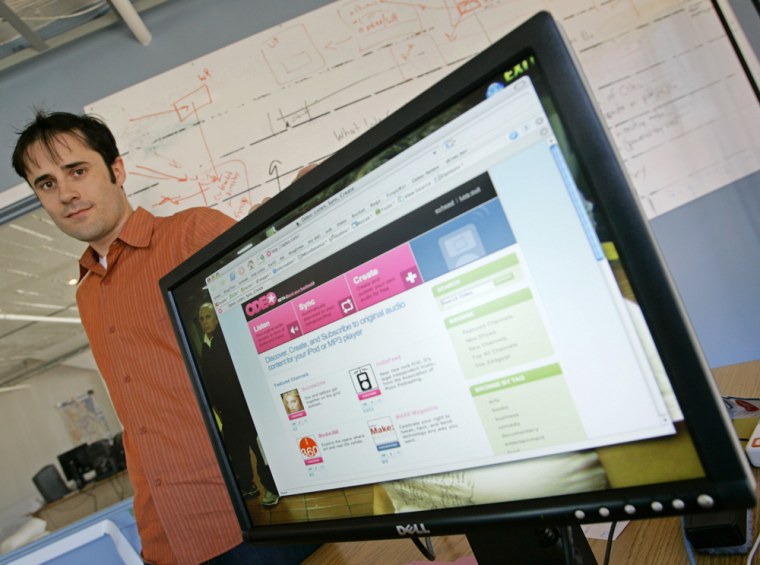The runaway popularity of blogging, which has turned everyday people into online news outlets, caught the media establishment off guard. The industry is trying not to make the same mistake with podcasting — which lets nearly anyone "broadcast" on the Internet.
Everyone from Disney to Newsweek to National Public Radio is now offering podcasts, and Apple Computer, Inc. last month made it a whole lot easier to find them and download them to iPods. (MSNBC.com also offers podcasts.)
While profits remain elusive, there's a bigger prize out there — the company that manages to become the go-to Web site for podcasts could gain enough leverage to strike favorable deals with proven content providers, and generate cash by charging for subscriptions and advertising.
Podcasts are recorded audio files, distributed via Internet download. They can be stored on computers or digital music players and played back whenever the listener chooses. Like bloggers, podcasters can sound off on whatever they please — from politics and religion to gladiolas and glass-blowing.
For now, podcasts are mostly talk — the complexities of the music-licensing business make it exceedingly difficult to legally include songs in the audio files. Podcasting isn't likely to explode in popularity until companies figure out how to guarantee that music owners get paid.
Help for podcasters, listeners
But as tens of thousands of podcasters seek audiences, a growing number of companies are trying to make sense of what's out there and become magnets for the best of it. They include not just Apple but also Podcastalley.com, Podcast.net and as of last weekend, another startup — Odeo.com.
In Odeo's newly renovated loft across the street from the Giants' ballpark, Evan Williams and his first nine employees have hustled to launch the beta version, which creates directories of podcasts for downloading and provides studio-quality sound tools for podcasters to use.
Odeo encourages podcasters to upload their shows on its site. Recognizing that one of the main complaints about podcasting is the difficulty of finding them, Odeo organizes the shows by genre. Odeo's headings includes arts, food, religion, sex, and technology. There is even a one called "weird."
To help listeners discover new shows, Odeo employees scour the site for the best and display their recommendations on the "Featured Channels" page.
Williams, who co-founded Blogger.com before selling it off to Google three years ago, is enough of a believer in podcasts to bankroll Odeo out of his own pocket. And while he won't say exactly how he plans to make a profit, he says charging for premium content or for access to digital recording tools is a possibility.
Gaining legal access to popular music may be what's needed for podcasting to become profitable. Without music, skeptics doubt there is any money in it.
"There is no easy way to license music legally for podcasts," says Fred von Lohmann, an attorney for the online civil liberties group Electronic Frontier Foundation. "You have to clear the rights one song at a time from record labels and artists and that's a painful process."
Williams, however, is optimistic: "If podcasting finds a large enough audience, the money will come."
Good quality wanted
Already, some podcasters are willing to pay for superior tools, according to Matt Galligan, who hosts a podcast called "The Spotlight" that promotes music from unsigned and little-known artists.
"If you don't have good audio quality, people won't listen to you," he said.
Podcast Alley is a typical Internet bootstrap operation, prized by fans of Internet "narrowcasting" not just for its podcast selection but also for free tools and tips.
Launched in November and featuring 4,100 podcasts, it has just one employee: founder Chris McIntyre, a 26-year-old programmer from Nashville, Tenn.
McIntyre says the number of podcasts has tripled in the past three months on his site and he's already begun selling enough ads to cover his expenses.
"Podcasts appeal to niche markets that can help advertisers zero in on their target audience," he said, adding that a podcast dedicated to endurance sports has received money from Gatorade for plugging the sports drink during the show.
In another sign that podcasting is attracting advertisers, Toyota has agreed to underwrite all the podcasts for Los Angeles-based radio station KCRW for six months in exchange for a 10-second mention in each of the shows, said Ruth Seymour, KCRW's general manager.
Apple on top
If anyone is positioned to win big on podcasting, it's Apple, which added an iPod directory that features more than 3,000 podcasts to the company's iTunes music-download site on June 28. Apple said more than a million podcasts were downloaded in the first two days the service was active.
With its marketing muscle and customer base — 16 million iPods sold — Apple has the clout and connections to strike deals to obtain music rights and collect licensing fees from podcasters wishing to become Web disc jockeys.
But it had better act fast.
NPR is negotiating with the music industry for podcasting rights as are other media companies, according to Seymour, whose station receives some of its programming from NPR.
She is eager for such a deal. Without one, KCRW is prevented from recording podcasts for shows that include music. That means fans of the popular "Morning Becomes Eclectic" must wait until music rights are obtained.
"The explosion for podcasting hasn't happened yet," said Seymour. "It takes off the second that someone gets the music rights."
